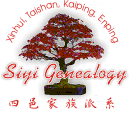

When Canada in 1885 imposed a $50 head tax on Chinese immigrants it wasn't the only nor the first country to do so, Australia in November 19, 1857 imposed a head tax of £10 on all Chinese arrivals. Canada's wasn't the first to use legislature to bar Chinese from entering the country either. The USA has this honour when in 1882 it passed the Chinese Exclusion Act. Less than twenty years later, in 1901 Australia passed the Immigration Restriction Act or better known as the White Australia Policy. In 1923 Canada passed the Chinese Immigration Act on July 1, ironically the nation's birthday.
What sets Canada's action apart from the others is the head tax was imposed soon after the completion of the TransCanada railway. During the latter phrase of this project thousands upon thousands of Chinese workers were brought in not only as a cost saving measure but also they were the only people who would worked in areas so dangerous that others had refused. Because the Chinese workers were paid substantially lower than the caucasian workers the Canadian government's saving was estimated to be nearly $3 million dollars.
These Chinese workers were assigned to work along the treacherous Fraser Canyon. Names such as Hell's Gate, Jaws of Death Arch, and Indictment Hole give an indication of the terrain. Some say for every foot of railway a Chinese died. Another reason for the high casualty is due to the fact the Chinese were more often than not given the backbreaking and hazardous jobs of tunneling and handling of explosives.
How important was the railway to Canada? One of British Columbia's conditions in joining the Dominion of Canada was a railway linking it to the rest of the country over the Rockie Mountains. Without the Chinese workers we could say with certainty there wouldn't be any railway. This was acknowledged by Sir John A. MacDonald, Canada's first Prime Minister. Without the railway, British Columbia wouldn't had joined the confederation of Canada. So Canada as we know today wouldn't even exist. However, during the Last Spike, a ceremony to commemorate the completion of the railway linking Canada from coast to coast, not one Chinese was present.
What consequences did these measures had on the Chinese aside from barring their entry? How did it affected the families, the wives and children? Did it affected the grandchildren?
In Australia, more than a few caucasians were surprised (shocked?) to discover their Chinese roots. Relations were suppressed such that grandchildren didn't know their grandparents despite the almost daily encounters. The term living windows and paper sons is a byproduct of the American Chinese Exclusion Act and its loophole. This was not, however, confined to those immigrated to the USA. It was more or less similar for those immigrated to Canada. Repealing the Chinese Immigration Act in 1947 created many paper sons Canadian style.
The head tax prevented all but a few wealthy Chinese from having their families joined them in Canada. As a matter of fact it took them years of hard work and saving just to repay their own head tax loans. It was only after the head tax loan was repaid then they can saved for the return trip. Then it is no surprise the immigrants were generally married at a later age than their stay-at-home counterparts. The Chinese Exclusion Act together with the Great Depression and the Japanese invasion and occupation of China meant many husbands and wives never meet again after their wedding. It was not uncommon for them to be separated for twenty or thirty years before they see each other again. For the more fortunate ones this interval was shorten to between five and ten years. All these meant many started their family only when they were in their forties or the age differences between siblings are such that they represented different generations. In most cases these children were deprived of knowing their grandparents and many of these parents didn't lived to see their children entered adulthood. We have at least two generations who weren't able to connect with their culture, heritage and past beyond their parents. We have at least two generations who did not know their grandparents.
Contrast this with the much heralded Canadian Homestead Program where immigrants prodominately from Eastern Europe to settle in the Canadian prairie. The government gave them free acrages of land in one of the world's bread baskets and generous assistances in establishing a new life in Canada. Click here for more detail. Yes, it is hard to believe we are speaking of the same country and in similar time frame.
As of today New Zealand is the only country whose government had openly apologized for imposing the head tax or the poll tax as it is called there. Many Canadians are seeking redress from the Canadian government. Compensation is a sticky issue within the Chinese community itself. Not just in Canada but on an international scale as the writings of Dr. Henry Chan and Kenda Gee give us examples of this great divide.
The Canadian government on November 16, 2005 annoounced a settlement of the Headtax issue with the National Congress of Chinese Canadians. Reactions from the Chinese community are far from favourable. Here is an article by Brad Lee of Toronto. David Wong of Vancouver wrote in his website:
" OttawaĄZĄZĄZs token $12.5 million belongs to the Lo Wah Kiu (pioneer Chinese Canadian) community. It is not to be ĄZĄZĄZsharedĄZĄZĄZ with other organizations for whatever altruistic reasons of ĄZĄZĄZdiversity, harmony or any of that other 'noble' stuffĄZĄZĄZ. This sort of happy funding is already in place by the Feds, and is being well tapped into by those who pander to Ottawa.
Our Headtax money is for the memory of our Lo Wah Kiu's, and is to be used for Chinese Canadian books, songs, poems, commemorations, films, movies, scholarships, parades, and aerial fly-throughs. Well okay, realistically... maybe $12.5m will pay for a couple of books and GST."